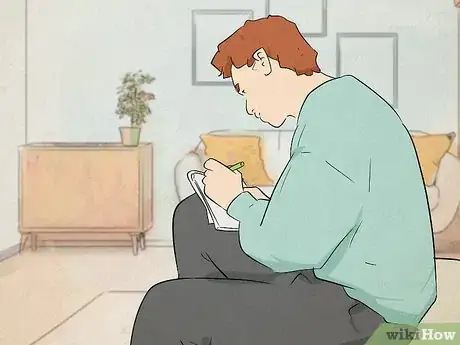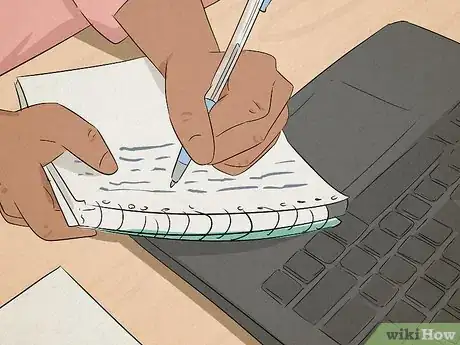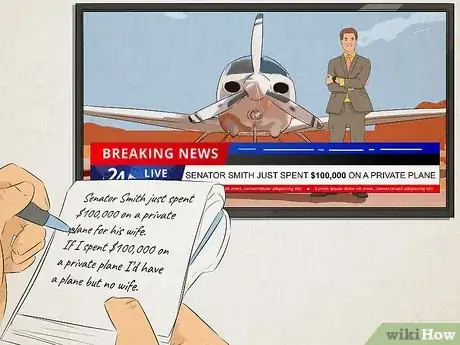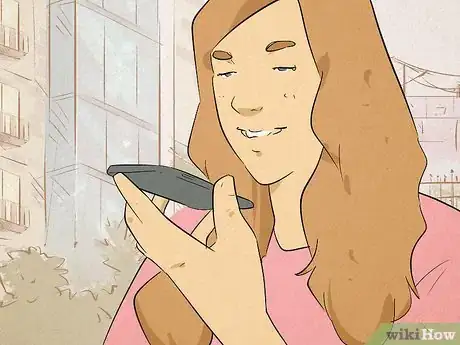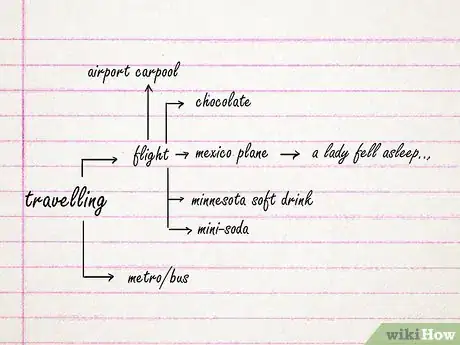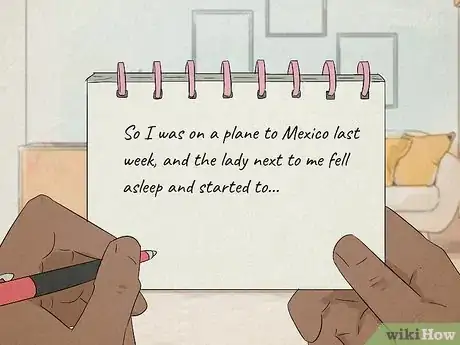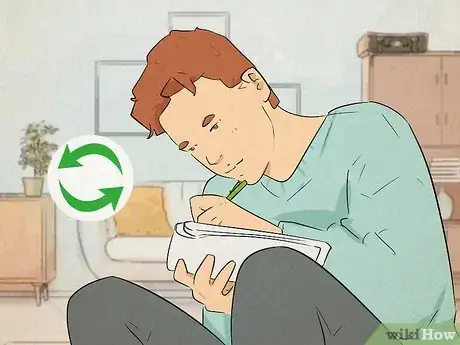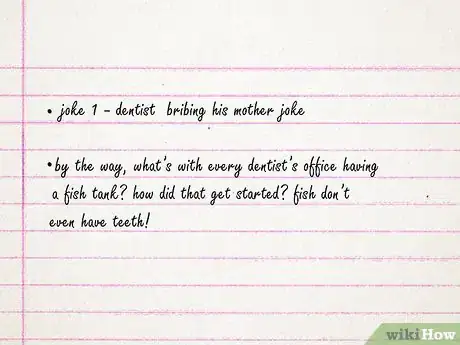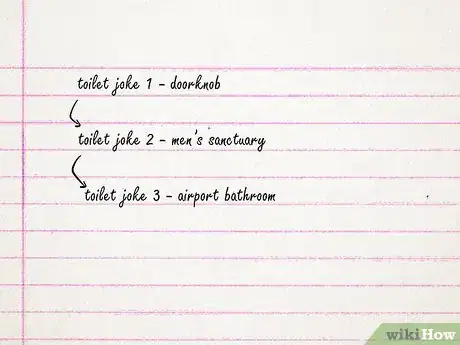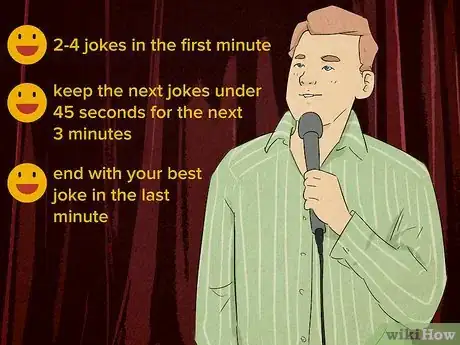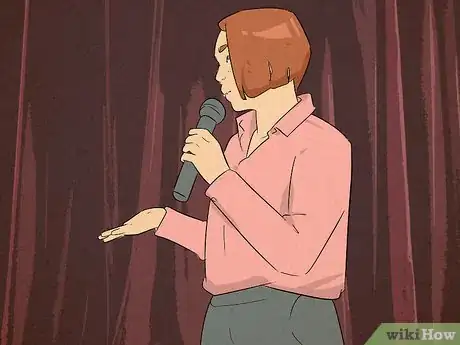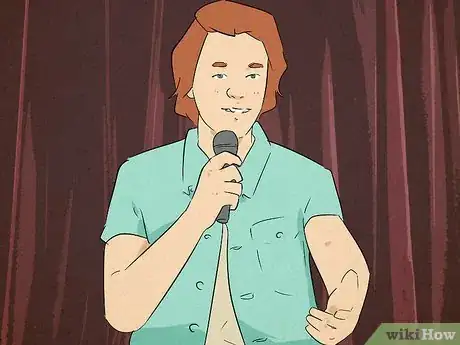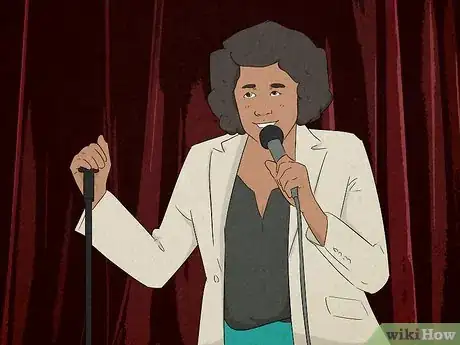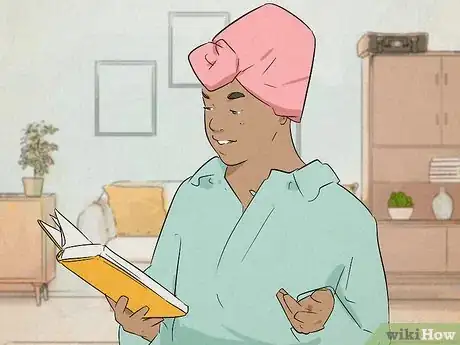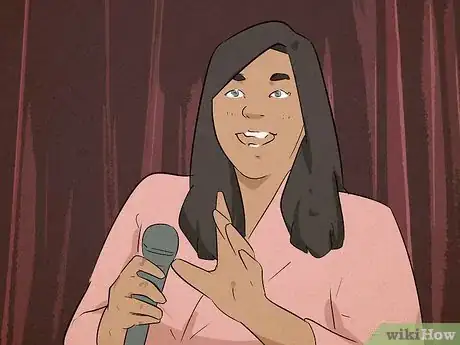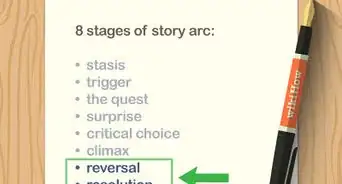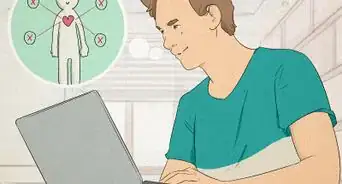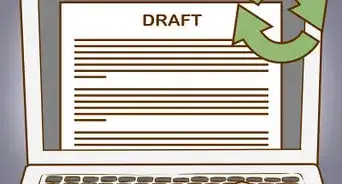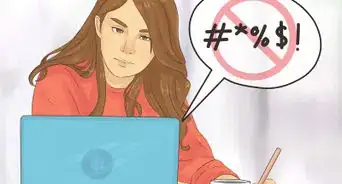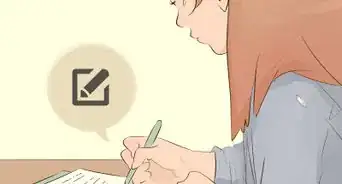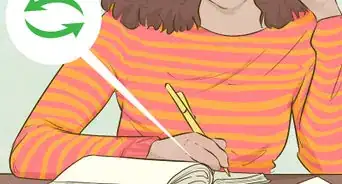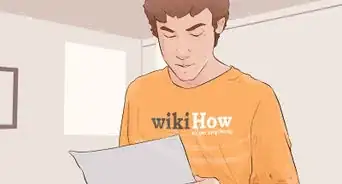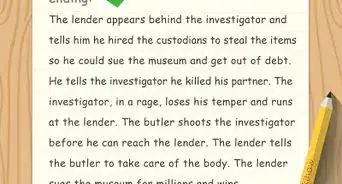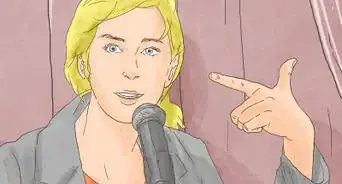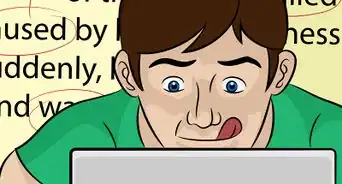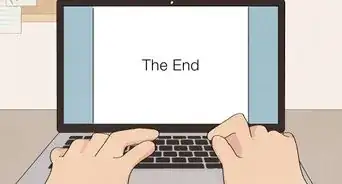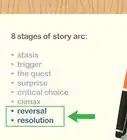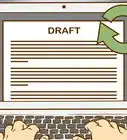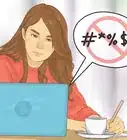This article was co-authored by Kendall Payne. Kendall Payne is a Writer, Director, and Stand-up Comedian based in Brooklyn, New York. Kendall specializes in directing, writing, and producing comedic short films. Her films have screened at Indie Short Fest, Brooklyn Comedy Collective, Channel 101 NY, and 8 Ball TV. She has also written and directed content for the Netflix is a Joke social channels and has written marketing scripts for Between Two Ferns: The Movie, Astronomy Club, Wine Country, Bash Brothers, Stand Up Specials and more. Kendall runs an IRL internet comedy show at Caveat called Extremely Online, and a comedy show for @ssholes called Sugarp!ss at Easy Lover. She studied at the Upright Citizens Brigade Theatre and at New York University (NYU) Tisch in the TV Writing Certificate Program.
There are 7 references cited in this article, which can be found at the bottom of the page.
This article has been viewed 83,991 times.
If your family and friends have told you that you are a funny person, you may have considered trying stand-up comedy. If you’re interested, writing stand-up is definitely something you can learn to do! We’ve put together this article to provide you with answers to some of the most common questions people have about writing jokes.
Steps
How do I come up with stand-up comedy topics?
-
1Get personal. Stand-up comedy is often more funny when the jokes are about personal issues, feelings, or opinions. Think of yourself as the main character in your act and use real life, personal experiences to help you come up with topics for your jokes.[1]
- Think about things you love, things you dislike, and things that annoy you.
- For example, if you have a love of Renaissance festivals, think about whether you always wear a costume that gets you funny looks in public or if there are certain "types" of people who attend the festivals that you could describe in a funny way.
- If you dislike subway rides, describe how annoying the subway is – people sitting too close, a couple making out in the corner, the one guy who always has his music playing without headphones.
-
2Build on a story. If you've already got a funny story you like to tell, use it for the base of your jokes. Build on it by telling jokes or other stories that are related.[2]
- For example, if you have a really funny story about going to a theme park, use that as your base story. Then write other jokes related to theme parks – they could be about the food, waiting in line, or dealing with kids.
Advertisement -
3Use the news as inspiration. Look for news stories that strike you as particularly ridiculous or funny or outrageous. Then make it personal using the following formula: "X happened in the news. If I did that/if that happened to me..." and fill in the rest.[3]
- Not everything that comes out of this exercise will be funny, but you'll occasionally get some good stuff!
- For example, if you see a news story about politicians behaving badly, you could use that. You could start the joke by saying something like: "Senator Smith just spent $100,000 on a private plane for his wife. If I spent $100,000 on a private plane I'd have a plane but no wife."
What are some stand-up comedy writing exercises?
-
1Record your thoughts on the go. Carry a small notebook with you (or download a notes app to your smartphone) and take note of what you find funny. You might want to write down something someone says, or something that happens to you or someone else. It can be great material for a joke.[4]
- For example, if you see someone pushing a grocery cart into a store and almost trip and it makes you laugh, pull out your notebook and write down everything about the scene that made it funny, such as how the person looked and how they reacted to almost tripping.
- You can also record yourself saying jokes into your smartphone’s voice recorder.
- Review everything you record at least once a week to retrieve your ideas.
-
2Write down everything you can think of about a certain topic. Don't try to force yourself to be funny, just write down whatever comes to mind. Set a timer for 5 or 10 minutes and write until the timer goes off.[5]
- For example, choose the topic of travelling and write down as many funny thoughts, feelings, and stories you have about trips you’ve been on or travelling in general.
-
3Draft a few jokes based on your brainstorming. In your free-writing, you might have written down funny words, weird stories you forgot about, or even questions. All of these things can be the good foundation for jokes. Pick 1 or 2 things you like best and write out a joke based on them – your first draft should be about 250 words.[6]
- For example, if you wrote down a bunch of funny thoughts about travelling, pick 1-2 of the funniest ideas and expand them into full length jokes with a beginning, a middle, and an end. Make sure the jokes have obvious punchlines to get people laughing.
- You might start a joke by saying something like: “So I was on a plane to Mexico last week, and the lady next to me fell asleep and started to…”
How do I write a stand-up comedy routine script?
-
1Revise jokes to make them short enough to fit together in a routine. Once you've got some individual jokes drafted, cut them from 250 words to 100, then to 50, then to 25. This forces you to get to the nugget of what's funny in your jokes. It also helps you get rid of unnecessary context or buildup, which can distract your audience.[7]
- Comedian Jerry Seinfeld recommends compressing shorter jokes together because it helps the laughter build up. When people don’t have time to stop laughing between jokes, the laughter in the room just keeps getting bigger and bigger.
-
2Come up with more similarly-themed jokes to fill in your routine script. Think about the topics your current jokes are about and then think of more funny emotions and images related to those topics. Write additional jokes around these ideas to fill in your comedy routine script.[8]
- For example, if you already have a couple of jokes about waiting in the lobby of the dentist’s office, try to imagine what it looks like there and how it makes you feel to come up with a few more jokes that fit into your set.
- You could say something like: “By the way, what’s with every dentist’s office having a fish tank? How did that get started? Fish don’t even have teeth!”
-
3Assemble your jokes into a logical sequence. Put similar jokes one after the other. Create connections between different jokes to string them together in a way that makes sense.[9]
- For example if you have 4-5 jokes about portable toilets, say those one after another, then lead into your story about a weird experience you had in an airport bathroom by saying something like: “Speaking of toilets, this one time I was in an airport bathroom and…” From there, you can move onto some more airport jokes or jokes about other public places.
How do you structure a 5-minute set?
-
1Tell 2-4 jokes in the first minute. Start with your second-best joke and from there continue to tell a few more of your shorter jokes. Unless you're a really well-known comic, the audience is going to be waiting to be impressed by you. To grab their attention and impress them right away, start your second-best joke. It's quick and easy and will make your audience laugh right away.[10]
- The more laughs you can get at the beginning of your set, the better your set can turn out. It's also a chance to establish your tone – are your jokes sarcastic, or self-deprecating? Do you deliver in a monotone or with a lot of energy? Let your audience get to know you as soon as possible.
-
2Try to keep your jokes under 45 seconds for the next 3 minutes. This keeps your audience engaged. If you have a great joke that's over 45 seconds long, make sure it's written to have a couple of punchlines along the way. That keeps your audience laughing and sets them up for the big punchline at the end.[11]
- The most important thing for the middle part of your set is that it flows. This is where having jokes in a logical order with good transitions between them is really helpful.
-
3End with your best joke in the last minute. You used your second best joke to open your set to get the audience laughing quickly, so now end your set with your best joke. You want to leave the audience laughing, and ending with your best joke will make your set more memorable.[12]
- When you’re actually delivering your set in real life, don’t forget to repeat your name and thank the audience before you walk off stage.
- You can also end by bringing back a punchline from earlier. For example, if you had a joke at the beginning of your set about spending Christmas with your mother-in-law, you can say something like: “And that’s why I’ll never go to my mother-in-law’s for Christmas again!”
How do I improve my comedy writing?
-
1Practice jokes in front of small audiences. This is a great way for amateur comedians to get a feel for what works and what doesn’t work. Gather a few friends or family members together or go to a small open mic night and deliver a set to your audience. Watch carefully how people react to each joke.[13]
- A good thing about practicing in front of people you know before you move onto comedy events is that you can ask them for feedback, too.
-
2Move on from jokes that don't work. If you tell a joke that bombs – no one laughs and the audience is just staring at you (or worse yet, they boo) – shake it off and move on. If you get too caught up in one joke failing, the rest of your jokes might also fail because you're delivering them with the same energy or personality. Every comic bombs from time to time – it's okay![14]
- As you perform your comedy more, you start to learn when a joke isn’t going to work in real time by watching your audience’s reactions. Then, you can cut the joke short or modify it to try and get a laugh. This is called “editing on the fly.”
-
3Work on shaping your comedic persona. Creating a unique comedic persona, or style, for yourself makes it easier to write jokes. Try to determine what your style is and focus your joke writing on writing from this point of view.[15]
- For instance, maybe you’re a shy, self-deprecating type of guy, or perhaps you’re a self-confident girl who doesn’t take you-know-what from anyone.
- If you decide your persona is going to be making fun of yourself, you can start jokes with things like: “So the other day I confirmed what I’ve known for a while now – I’m really bad at sports.”
References
- ↑ https://www.masterclass.com/articles/9-secrets-to-writing-stand-up-comedy-from-judd-apatow#2-get-personal
- ↑ Kendall Payne. Writer, Director, & Stand-up Comedian. Expert Interview. 3 April 2020.
- ↑ http://www.goldcomedy.com/resources/comedy-writing-exercises/
- ↑ https://www.theguardian.com/books/2008/sep/22/comedy3
- ↑ http://www.goldcomedy.com/resources/comedy-writing-exercises/
- ↑ http://www.goldcomedy.com/resources/comedy-writing-exercises/
- ↑ http://www.goldcomedy.com/resources/comedy-writing-exercises/
- ↑ https://www.writersdigest.com/write-better-nonfiction/jerry-seinfelds-5-step-comedy-writing-process
- ↑ https://www.writersdigest.com/write-better-nonfiction/jerry-seinfelds-5-step-comedy-writing-process
- ↑ http://devincomedy.com/5min/
- ↑ http://devincomedy.com/5min/
- ↑ http://devincomedy.com/5min/
- ↑ https://www.writersdigest.com/write-better-nonfiction/jerry-seinfelds-5-step-comedy-writing-process
- ↑ http://devincomedy.com/5min/
- ↑ https://www.masterclass.com/articles/how-to-write-stand-up-comedy-in-6-easy-steps#8-tips-and-tricks-for-writing-standup-comedy
